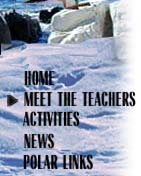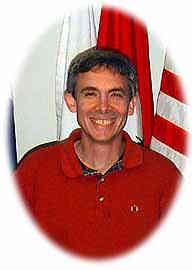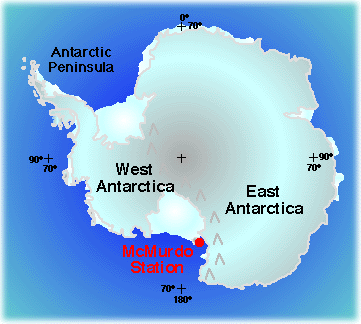
|
|






Hi! I'm Skip Zwanzig. I teach biology to 10th grade advanced students at duPont Manual High School in Louisville, Kentucky. Manual High School is a magnet school for gifted and high ability students from all around the county. I teach in the Math, Science and Technology magnet. I have 5 biology classes of wonderful and fun students. I have been teaching at Manual for the last 8 years. Prior to that I was moved from school to school according to the student population growth/loss. Teaching at Manual is almost like teaching in college. Each day I look forward to being at school with "my kids" because they are so much fun to be with.
I am a very hands-on teacher. I think students learn by doing science not just by reading about it. All of my students conduct their own research. It is a requirement of the MST program. In my opinion it is one of the most important part of the student's education. I try to conduct the research part of my classes like it would be done in a real lab. Students parcticipate in research seminars throughout the school year where they present their current status in the research project and get feedback from one another. Many of my students are working in research labs at the local university and the medical school.
Each summer I try to find programs that I can parcticipate in that will help make me a better teacher. I parcticipated in my first summer research program in 1992. I worked for eight weeks with Dr. Priscilla Cooper at the Lawrence Berkeley Research Labs in California. That summer experience working with DNA replication completely changed by style of teaching. The Antarctic Research Program will be my third research activity but not my last. The research experiences have taught me as much as any year spent in college. My students have benefitted from my time spent in research.
My own background is not much to speak about. I came from a poor family. My father was disinherited from a wealthy family in Illinois. He struggled for many years to put food on the table each day but we always managed to get by. Actually we were better off than most people in the community I grew up in. We had bragging rights as the only people in the neighborhood with a "two seater" outhouse. My family is a very closely bonded family. We may have been poor but there was and still is a lot of love in our family.
Getting into education was kind of an accident for me. After graduating from high school I spent four years in the Marine Corps where I rose fairly quickly through the enlisted ranks. It seems like everthing I did in the military involved teaching of some sort. I left the military and three days later was sitting in a college class at a small university. I was probably the oldest student on campus so I had an age advantage when a professor needed a teaching assistant. Without realizing it I was being prepared for a teaching career before I had ever decided to become a teacher. I went on to graduate school because I did not have a clue what I wanted to do for the rest of my life. In my second year of graduate school was given a teaching assistantship and given my own undergraduate class to teach. Because of that experience, and not wanting to leave school yet, I spent another year picking up the required courses to teach high school. It is a career I love and cannot see myself ever doing anything else on a permanent basis.
There are two experiences in life that I have always wanted to have. I have wanted to travel in space and I have always wanted to go to Antarctica. As a boy I read every biography I could get my hands on about the Antarctic and Arctic explorers. At the last NABT conference I attended a presentation on the TEA program. You cannot imagine how excited I was sitting there listening to the presentation. It did not take me long to get my application in. I sat on pins and needles waiting to hear whether or not I was going to be one of the lucky few to be selected for this years's groups of TEAs. I am still floating since my phone call from NSF. It has to be the most exciting thing I have ever done.
While in Antarctica I will be assisting Dr. David Petzel in his studies on the role and regulation of chloride cells in Antarctic fish. These cells are what seem to control the level of chloride ions in Antarctic fish which in turn allows the fish to survive in the cold waters of the Antarctic. We will be comparing these fish to warmer climate fish found in New Zealand. I will be spending my time in Antarctica in areas around the McMurdo Sound sea ice, Cape Bird, and the ice edge.

The Role and Regulation of Chloride Cells in Antarctic
Fish
Dr. David Petzel, Department of Biomedical Sciences
Creighton University, Omaha, Nebraska
While I am in Antarctica, I will be working with Dr. David Petzel from Creighton University. He is studying the role and regulation of chloride cells in Antarctic fish. These fish are unique among all bony fish because they have the highest concentration of sodium and chlorine ions in their blood. They also have a special protein in their blood which adds to their ability to survive in water temperatures down to -2C.
The concentration of salts decreases with increasing water temperature. There are specific enzymes that control the concentration of these salts which may be controlled by the water temperatures. Our research will be looking at how these enzymes are regulated. The answers to these questions may impact patients with high blood pressure. Patients with high blood pressure retain salt in their blood. Understanding how Antarctic fish reduce the concentration of salt in their blood with increased temperature could lead to the discovery of agents which may help regulate high blood pressure.
Polar Classroom Activities:
Bacteria - Living in Extreme Environments
The
Case of the Missing Penguins - A Protein Analysis Activity

Skip
will be working at McMurdo Station during his field season in
Antarctica.

November 1998
| Su |
Mo |
Tu |
We |
Th |
Fr |
Sa |
| 1 |
2 |
3 |
4 |
5 |
6 |
7 |
| 8 |
9 |
10 |
11 |
12 |
13 |
14 |
| 15 |
16 |
17 |
18 |
19 |
20 |
21 |
| 22 |
23 |
24 |
25 |
26 |
27 |
28 |
| 29 |
30 |
-- |
-- |
-- |
-- |
-- |
October 1998
September 1998
| Su |
Mo |
Tu |
We |
Th |
Fr |
Sa |
| -- |
-- |
1 |
2 |
3 |
4 |
5 |
| 6 |
7 |
8 |
9 |
10 |
11 |
12 |
| 13 |
14 |
15 |
16 |
17 |
18 |
19 |
| 20 |
21 |
22 |
23 |
24 |
25 |
26 |
| 27 |
28 |
29 |
30 |
-- |
-- |
-- |
July 1998
| Su |
Mo |
Tu |
We |
Th |
Fr |
Sa |
| -- |
-- |
-- |
1 |
2 |
3 |
4 |
| 5 |
6 |
7 |
8 |
9 |
10 |
11 |
| 12 |
13 |
14 |
15 |
16 |
17 |
18 |
| 19 |
20 |
21 |
22 |
23 |
24 |
25 |
| 26 |
27 |
28 |
29 |
30 |
31 |
-- |
February 1998
| Su |
Mo |
Tu |
We |
Th |
Fr |
Sa |
| 1 |
2 |
3 |
4 |
5 |
6 |
7 |
| 8 |
9 |
10 |
11 |
12 |
13 |
14 |
| 15 |
16 |
17 |
18 |
19 |
20 |
21 |
| 22 |
23 |
24 |
25 |
26 |
27 |
28 |
Return to top of page
|
